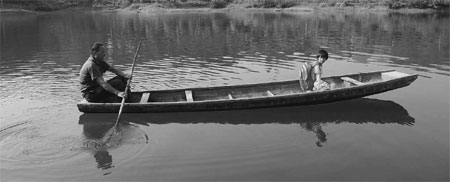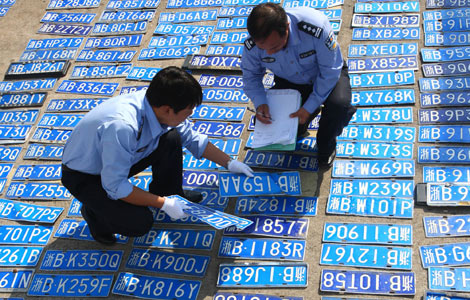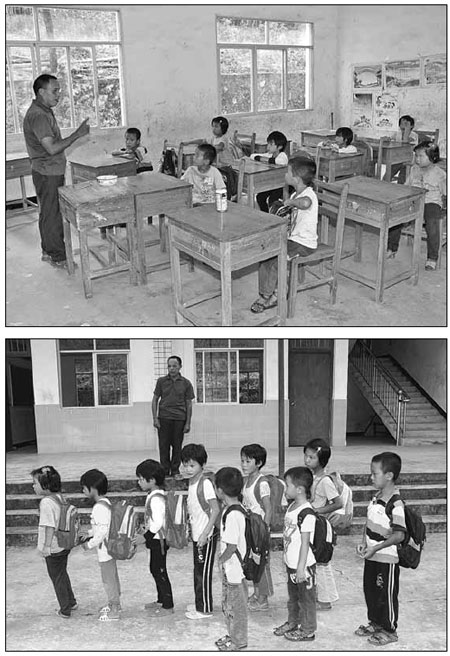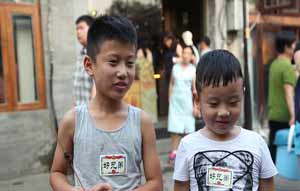Boatman teacher
Updated: 2013-10-15 07:39
By Li Yang (China Daily USA)
|
||||||||
Despite the lure of better opportunities away from home, two teachers from Lipu in the Guangxi Zhuang autonomous region have remained committed to giving their students an education. Li Yang meets the dedicated pair.
Zhang Fuyou, 60, has been a "boatman teacher" since 1975. He ferries primary school pupils from villages in the Dalong town of Lipu county in the Guangxi Zhuang autonomous region across a reservoir to Dajiang Primary School every day.
Together with several villages, the school was separated from the other villages in 1958 when a river was dammed to form a large reservoir.
Founded in the 1950s, the mountain school had more than 300 students and 15 teachers at its prime in 1985, but now it only comprises nine students and two teachers. Zhang Fuyou is one of those teachers.
It takes Zhang 15 minutes to carry the students across the narrowest part of the reservoir, saving them two hours of walking on a wild mountain path. When the water recedes in winter, he has to trudge over the riverbed mud and stones in rubber boots to push the boat across the water.
In late 1980s, he used to ferry about 20 students. But now, he ferries only 6-year-old Liu Lihua. "It does not make much of a difference," Zhang says.
He worked as a railway construction worker from 1972-74 after graduating from high school and became a teacher after that, taking over the job from a retired teacher.
Born to a poor farmer as the second child of five siblings in 1953, Zhang inherited the hardworking character and sympathy for the poor from his illiterate parents.
As the first literate person in his family, he decided to teach in the mountains after graduating from high school to "help more people to walk out of the mountains".
Two of his younger brothers were his students. "Both of them are civil servants now," Zhang says with a proud smile.
Zhang teaches the students all subjects. He even teaches students how to swim in shallow parts of the reservoir during summer vacation. "Swimming is a compulsory course here," Zhang says. A gust of strong wind capsized his boat with eight students onboard during the summer of 2000. Thanks to the students' swimming skills, they turned over the boat together and managed to reach the bank safely.
One lesson Zhang learned from the accident was that wooden boats are the best, because "it floats on the water even after being capsized".
Over the past 38 years, he has scrapped more than 10 wooden boats. After the boat becomes too decayed to sail, he turned the boats into beehives to raise bees. His village house, built with mud bricks, thatch and wood, is surrounded by more than 100 beehives.
He sells the honey for extra income and buys a new boat, every four years, which costs 2,500 yuan (about $400).
All of his nine students, from grade one to grade three, are left-behind children, whose parents work in neighboring Guangdong province as migrant workers, leaving them with their grandparents at home. Zhang and his 58-year-old colleague Lu Xingping call themselves "left-behind teachers".
They had many chances to leave the school to teach in a better school. "If we leave, the children will probably drop out of school," Zhang says. "We live in nearby villages. So we are obliged to stay," echoes Lu.
Both Zhang and Lu feel it is more difficult to teach the left-behind children, especially the left-behind ethnic minority students. There are two Yao ethnic group students in their classes.
"The left-behind children are invariably more shy and timid than kids living with parents," says Zhang. "They need special care from the society. Their teachers are their only 'society', apart from their grandparents. We 'left-behind' teachers have an important role to play."
Five-year-old Wei Qiaolin is the youngest pupil in the school. Her grandmother Lin Xiujuan, 70, comes to school to take her home. Qiaolin refuses to walk the two hours back home after a tiring school day. With tears in her eyes, she tells her grandmother that her feet and legs are too painful to walk.
"She did not speak a single word or smile all day," says Zhang. "Her grandpa was an old respected teacher here. But her grandparents' love cannot replace her parents'."
Lin stays overnight with her granddaughter in the school for the night. Zhang and Lu prepare a room for young students and their grandparents to stay over when they cannot go home because of illness and bad weather.
"Compared with the children's sufferings, my boat work is not worth mentioning at all," Zhang says. "Their parents authorized me to punish the children physically. But I cannot bear to do so."
Zhang's two children work as migrant workers in Lipu. His farmer wife lives with their son and helps to take care of their grandson in the county.

Zhang visits his wife and children once every few months. He has lived by himself for two years. He is content with his life. During his free time, he tends a small patch of mountain farmland and his countless bees, as well as plays with his cat.
"My students and their families and my neighbors often come to see me. The feeling of a community is much stronger than the urban residents living in 'concrete woods'," Zhang says.
He will retire next February. His wife Xie Yujiao, 53, says he is a good husband and father. She hopes he can have a good rest after retirement and take good care of his arthritis, hypertension and heart diseases.
But Zhang assures the students and villagers that he will continue to work as a volunteer teacher and boatman until the school has no more students.
"I simply cannot bid farewell to the children," he adds.
Contact the writer at liyang@chinadaily.com.cn.
Huo Yan contributed to the story.

|
Top: Zhang Fuyou, 60, ferries 6-year-old Liu Lihua across a reservoir to Dajiang Primary School. Above: Zhang Fuyou teaches nine students at Dajiang Primary School at Dalong town of Lipu county in the Guangxi Zhuang autonomous region. Photos by Huo Yan / China Daily |
(China Daily USA 10/15/2013 page10)

 New Yorkers celebrates Columbus Day
New Yorkers celebrates Columbus Day
 Storm swamps car insurance firms
Storm swamps car insurance firms
 Smartphone firm rockets into the US
Smartphone firm rockets into the US
 3 US economists share 2013 Nobel Prize in Economics
3 US economists share 2013 Nobel Prize in Economics
 Canton Fair to promote yuan use
Canton Fair to promote yuan use
 Vintage cars gather in downtown Beijing
Vintage cars gather in downtown Beijing
 Senate leads hunt for shutdown and debt deal
Senate leads hunt for shutdown and debt deal
 Chinese education for Thai students
Chinese education for Thai students
Most Viewed
Editor's Picks

|

|

|

|

|

|
Today's Top News
Airport bomber sentenced to 6 years in jail
Conference salutes China-US ties progress
The itch that Kobe just can't scratch
Cosmetics is a mirror to China's economy
Chinese may have discovered the future of batteries
4 dead, power cut as M7.2 quake rocks Philippines
Row over NASA's ban should be wake-up call
Baidu 'worry ranking' exposes netizen anxieties
US Weekly

|

|








